Brexit's Implications for UK Industries and Financial Sector Analysis
VerifiedAdded on 2023/01/12
|9
|2510
|90
Report
AI Summary
This report delves into the economic implications of Brexit on the industrial sector of the UK, with a particular emphasis on its effects on the financial and insurance industries. It examines the multifaceted challenges posed by Brexit, including the loss of passporting rights, regulatory impacts, and cross-border trade difficulties. The report highlights the detrimental impact on economic growth, trade, and employment, while also analyzing the regulatory challenges faced by the financial sector. It underscores the critical need for government intervention to mitigate market inefficiencies and ensure the continued competitiveness of the UK's financial industry. The analysis covers various perspectives, including regulatory impact, economic fortunes, and cross-border trade, and stresses the importance of maintaining strong relationships with the EU and the need for the government to adopt policies that enhance the competitiveness of the UK's financial sector. The report concludes that while the financial industry is adapting to changes, government intervention is essential to address market inefficiencies and secure a favorable outcome for the sector.
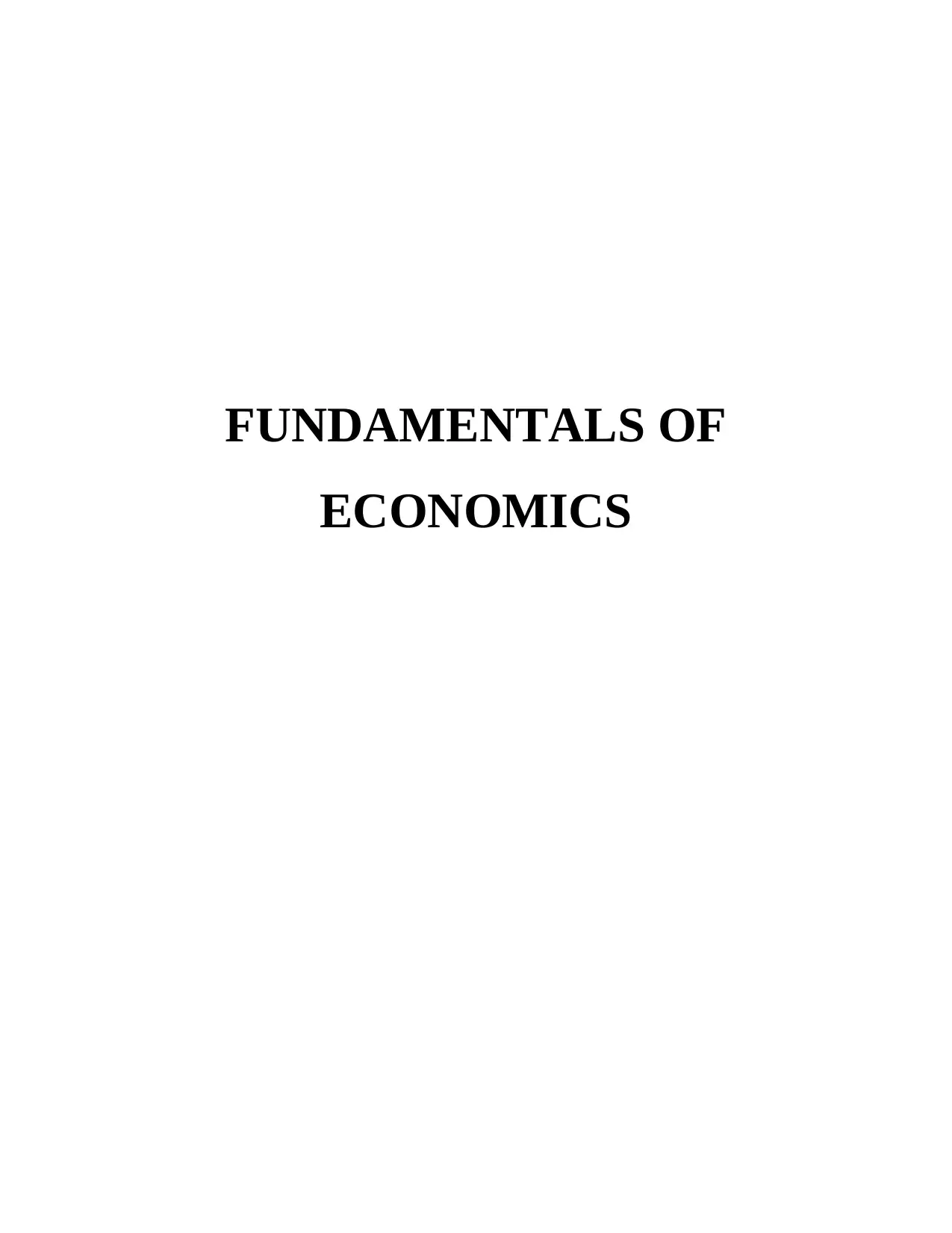
FUNDAMENTALS OF
ECONOMICS
ECONOMICS
Paraphrase This Document
Need a fresh take? Get an instant paraphrase of this document with our AI Paraphraser

ABSTRACT
Study is based over the implications of Brexit over the industrial sector of UK. Report
addresses the issues to financial sector and what are the implications on the financial and
insurance industry of UK. Report reveals that the government is essential for helping the
organisation to remove the inefficiencies and achieve growth.
Study is based over the implications of Brexit over the industrial sector of UK. Report
addresses the issues to financial sector and what are the implications on the financial and
insurance industry of UK. Report reveals that the government is essential for helping the
organisation to remove the inefficiencies and achieve growth.

TABLE OF CONTENTS
ABSTRACT.....................................................................................................................................2
INTRODUCTION...........................................................................................................................1
ESSAY.............................................................................................................................................1
CONCLUSION................................................................................................................................5
REFERENCES................................................................................................................................6
ABSTRACT.....................................................................................................................................2
INTRODUCTION...........................................................................................................................1
ESSAY.............................................................................................................................................1
CONCLUSION................................................................................................................................5
REFERENCES................................................................................................................................6
⊘ This is a preview!⊘
Do you want full access?
Subscribe today to unlock all pages.

Trusted by 1+ million students worldwide
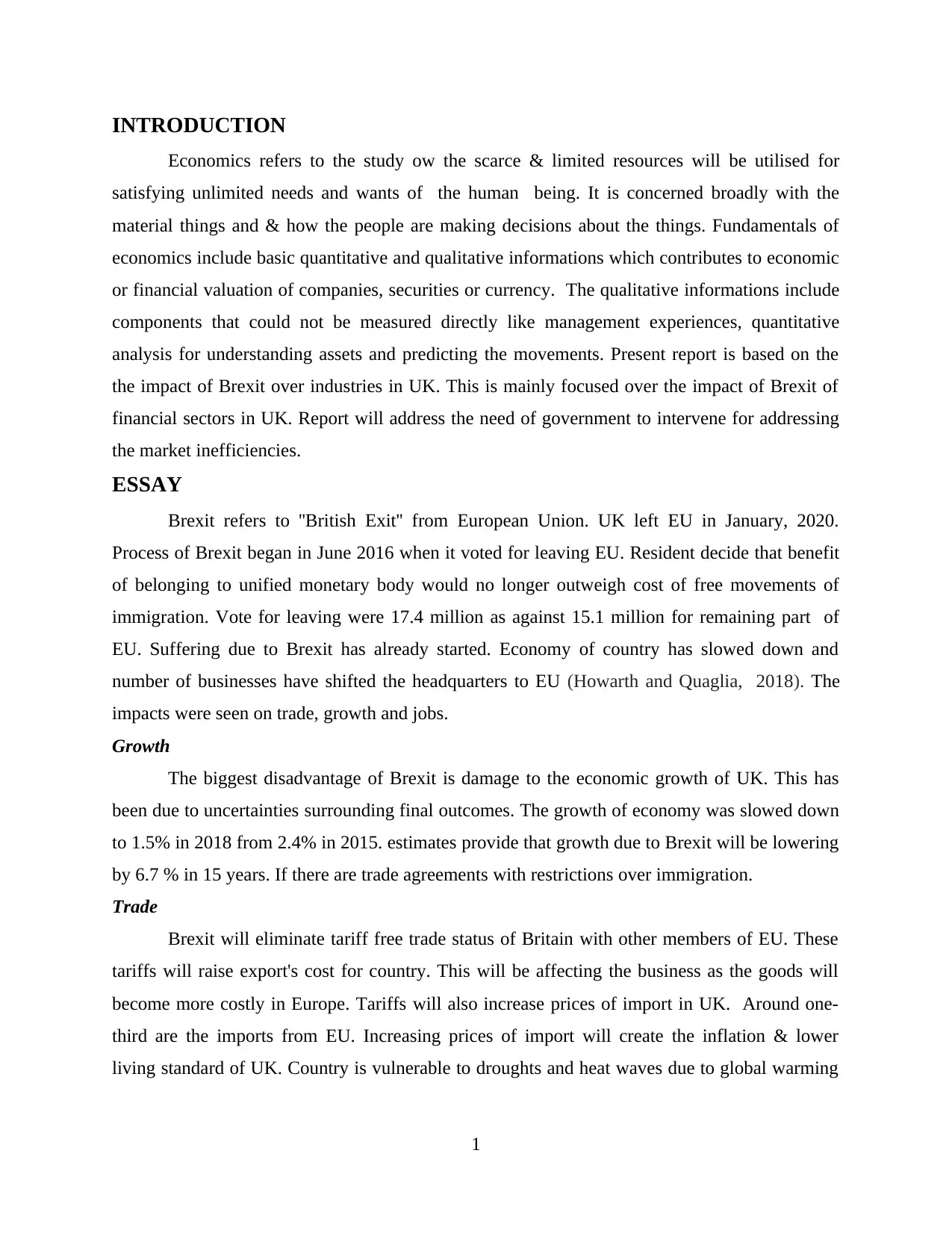
INTRODUCTION
Economics refers to the study ow the scarce & limited resources will be utilised for
satisfying unlimited needs and wants of the human being. It is concerned broadly with the
material things and & how the people are making decisions about the things. Fundamentals of
economics include basic quantitative and qualitative informations which contributes to economic
or financial valuation of companies, securities or currency. The qualitative informations include
components that could not be measured directly like management experiences, quantitative
analysis for understanding assets and predicting the movements. Present report is based on the
the impact of Brexit over industries in UK. This is mainly focused over the impact of Brexit of
financial sectors in UK. Report will address the need of government to intervene for addressing
the market inefficiencies.
ESSAY
Brexit refers to ''British Exit'' from European Union. UK left EU in January, 2020.
Process of Brexit began in June 2016 when it voted for leaving EU. Resident decide that benefit
of belonging to unified monetary body would no longer outweigh cost of free movements of
immigration. Vote for leaving were 17.4 million as against 15.1 million for remaining part of
EU. Suffering due to Brexit has already started. Economy of country has slowed down and
number of businesses have shifted the headquarters to EU (Howarth and Quaglia, 2018). The
impacts were seen on trade, growth and jobs.
Growth
The biggest disadvantage of Brexit is damage to the economic growth of UK. This has
been due to uncertainties surrounding final outcomes. The growth of economy was slowed down
to 1.5% in 2018 from 2.4% in 2015. estimates provide that growth due to Brexit will be lowering
by 6.7 % in 15 years. If there are trade agreements with restrictions over immigration.
Trade
Brexit will eliminate tariff free trade status of Britain with other members of EU. These
tariffs will raise export's cost for country. This will be affecting the business as the goods will
become more costly in Europe. Tariffs will also increase prices of import in UK. Around one-
third are the imports from EU. Increasing prices of import will create the inflation & lower
living standard of UK. Country is vulnerable to droughts and heat waves due to global warming
1
Economics refers to the study ow the scarce & limited resources will be utilised for
satisfying unlimited needs and wants of the human being. It is concerned broadly with the
material things and & how the people are making decisions about the things. Fundamentals of
economics include basic quantitative and qualitative informations which contributes to economic
or financial valuation of companies, securities or currency. The qualitative informations include
components that could not be measured directly like management experiences, quantitative
analysis for understanding assets and predicting the movements. Present report is based on the
the impact of Brexit over industries in UK. This is mainly focused over the impact of Brexit of
financial sectors in UK. Report will address the need of government to intervene for addressing
the market inefficiencies.
ESSAY
Brexit refers to ''British Exit'' from European Union. UK left EU in January, 2020.
Process of Brexit began in June 2016 when it voted for leaving EU. Resident decide that benefit
of belonging to unified monetary body would no longer outweigh cost of free movements of
immigration. Vote for leaving were 17.4 million as against 15.1 million for remaining part of
EU. Suffering due to Brexit has already started. Economy of country has slowed down and
number of businesses have shifted the headquarters to EU (Howarth and Quaglia, 2018). The
impacts were seen on trade, growth and jobs.
Growth
The biggest disadvantage of Brexit is damage to the economic growth of UK. This has
been due to uncertainties surrounding final outcomes. The growth of economy was slowed down
to 1.5% in 2018 from 2.4% in 2015. estimates provide that growth due to Brexit will be lowering
by 6.7 % in 15 years. If there are trade agreements with restrictions over immigration.
Trade
Brexit will eliminate tariff free trade status of Britain with other members of EU. These
tariffs will raise export's cost for country. This will be affecting the business as the goods will
become more costly in Europe. Tariffs will also increase prices of import in UK. Around one-
third are the imports from EU. Increasing prices of import will create the inflation & lower
living standard of UK. Country is vulnerable to droughts and heat waves due to global warming
1
Paraphrase This Document
Need a fresh take? Get an instant paraphrase of this document with our AI Paraphraser
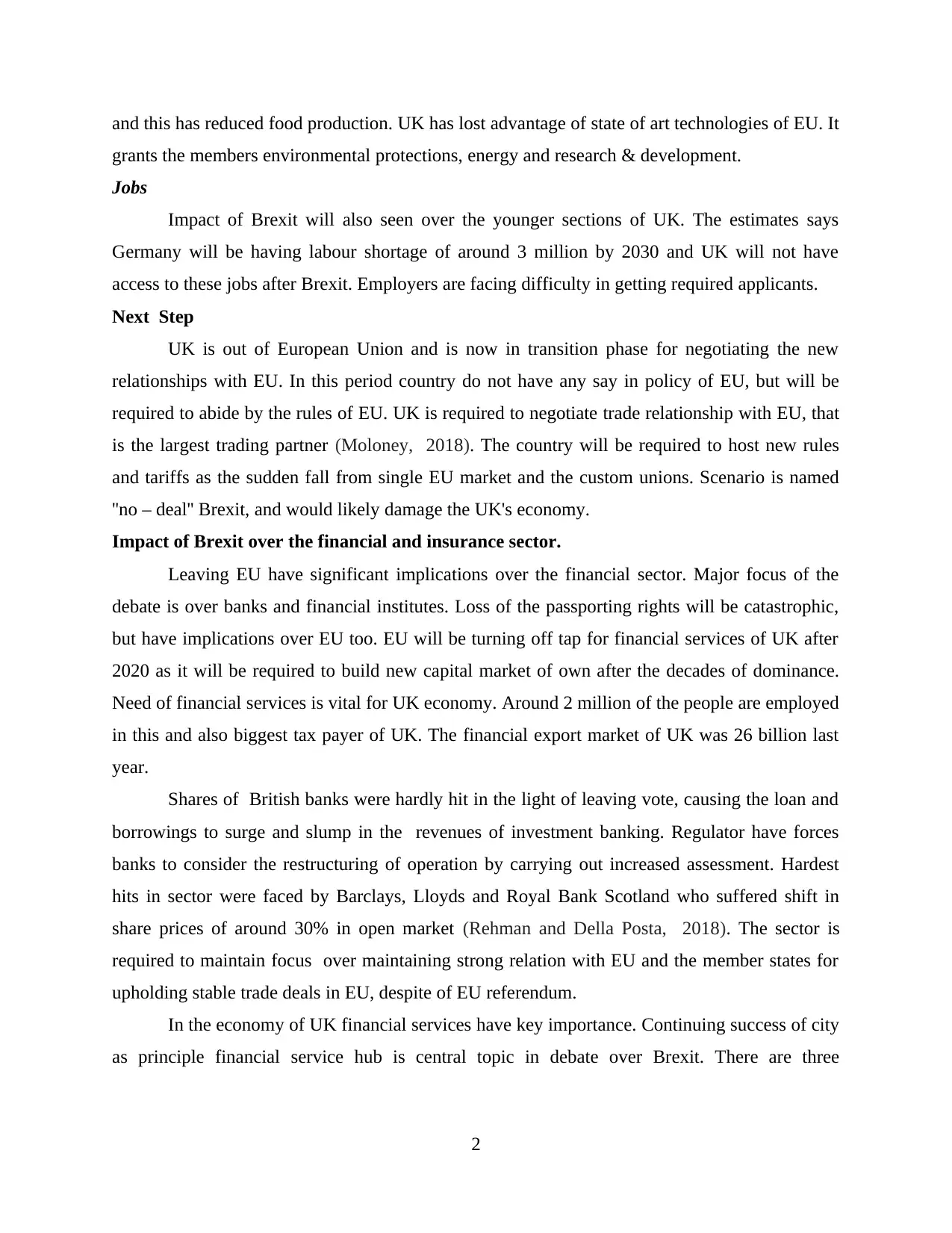
and this has reduced food production. UK has lost advantage of state of art technologies of EU. It
grants the members environmental protections, energy and research & development.
Jobs
Impact of Brexit will also seen over the younger sections of UK. The estimates says
Germany will be having labour shortage of around 3 million by 2030 and UK will not have
access to these jobs after Brexit. Employers are facing difficulty in getting required applicants.
Next Step
UK is out of European Union and is now in transition phase for negotiating the new
relationships with EU. In this period country do not have any say in policy of EU, but will be
required to abide by the rules of EU. UK is required to negotiate trade relationship with EU, that
is the largest trading partner (Moloney, 2018). The country will be required to host new rules
and tariffs as the sudden fall from single EU market and the custom unions. Scenario is named
''no – deal'' Brexit, and would likely damage the UK's economy.
Impact of Brexit over the financial and insurance sector.
Leaving EU have significant implications over the financial sector. Major focus of the
debate is over banks and financial institutes. Loss of the passporting rights will be catastrophic,
but have implications over EU too. EU will be turning off tap for financial services of UK after
2020 as it will be required to build new capital market of own after the decades of dominance.
Need of financial services is vital for UK economy. Around 2 million of the people are employed
in this and also biggest tax payer of UK. The financial export market of UK was 26 billion last
year.
Shares of British banks were hardly hit in the light of leaving vote, causing the loan and
borrowings to surge and slump in the revenues of investment banking. Regulator have forces
banks to consider the restructuring of operation by carrying out increased assessment. Hardest
hits in sector were faced by Barclays, Lloyds and Royal Bank Scotland who suffered shift in
share prices of around 30% in open market (Rehman and Della Posta, 2018). The sector is
required to maintain focus over maintaining strong relation with EU and the member states for
upholding stable trade deals in EU, despite of EU referendum.
In the economy of UK financial services have key importance. Continuing success of city
as principle financial service hub is central topic in debate over Brexit. There are three
2
grants the members environmental protections, energy and research & development.
Jobs
Impact of Brexit will also seen over the younger sections of UK. The estimates says
Germany will be having labour shortage of around 3 million by 2030 and UK will not have
access to these jobs after Brexit. Employers are facing difficulty in getting required applicants.
Next Step
UK is out of European Union and is now in transition phase for negotiating the new
relationships with EU. In this period country do not have any say in policy of EU, but will be
required to abide by the rules of EU. UK is required to negotiate trade relationship with EU, that
is the largest trading partner (Moloney, 2018). The country will be required to host new rules
and tariffs as the sudden fall from single EU market and the custom unions. Scenario is named
''no – deal'' Brexit, and would likely damage the UK's economy.
Impact of Brexit over the financial and insurance sector.
Leaving EU have significant implications over the financial sector. Major focus of the
debate is over banks and financial institutes. Loss of the passporting rights will be catastrophic,
but have implications over EU too. EU will be turning off tap for financial services of UK after
2020 as it will be required to build new capital market of own after the decades of dominance.
Need of financial services is vital for UK economy. Around 2 million of the people are employed
in this and also biggest tax payer of UK. The financial export market of UK was 26 billion last
year.
Shares of British banks were hardly hit in the light of leaving vote, causing the loan and
borrowings to surge and slump in the revenues of investment banking. Regulator have forces
banks to consider the restructuring of operation by carrying out increased assessment. Hardest
hits in sector were faced by Barclays, Lloyds and Royal Bank Scotland who suffered shift in
share prices of around 30% in open market (Rehman and Della Posta, 2018). The sector is
required to maintain focus over maintaining strong relation with EU and the member states for
upholding stable trade deals in EU, despite of EU referendum.
In the economy of UK financial services have key importance. Continuing success of city
as principle financial service hub is central topic in debate over Brexit. There are three
2
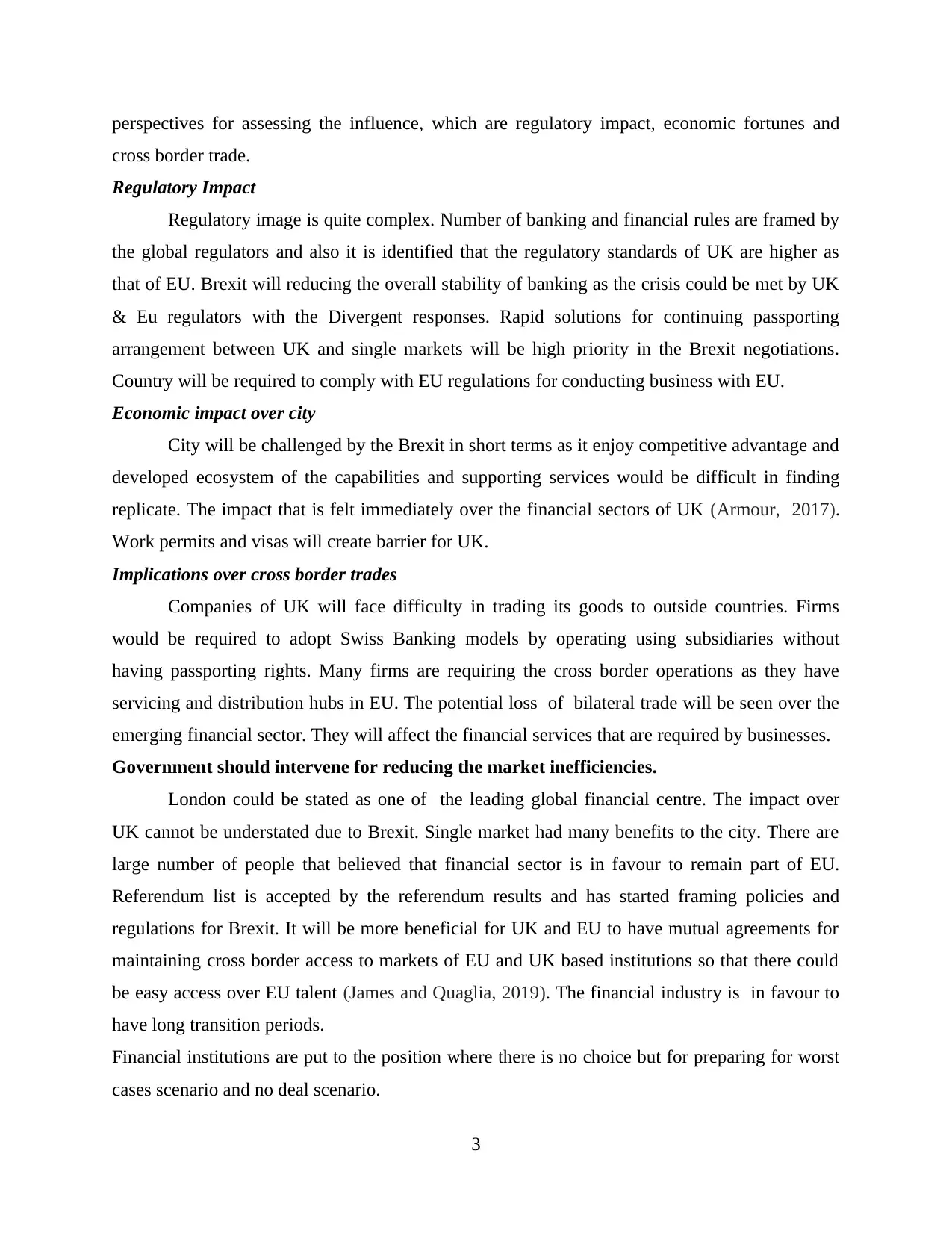
perspectives for assessing the influence, which are regulatory impact, economic fortunes and
cross border trade.
Regulatory Impact
Regulatory image is quite complex. Number of banking and financial rules are framed by
the global regulators and also it is identified that the regulatory standards of UK are higher as
that of EU. Brexit will reducing the overall stability of banking as the crisis could be met by UK
& Eu regulators with the Divergent responses. Rapid solutions for continuing passporting
arrangement between UK and single markets will be high priority in the Brexit negotiations.
Country will be required to comply with EU regulations for conducting business with EU.
Economic impact over city
City will be challenged by the Brexit in short terms as it enjoy competitive advantage and
developed ecosystem of the capabilities and supporting services would be difficult in finding
replicate. The impact that is felt immediately over the financial sectors of UK (Armour, 2017).
Work permits and visas will create barrier for UK.
Implications over cross border trades
Companies of UK will face difficulty in trading its goods to outside countries. Firms
would be required to adopt Swiss Banking models by operating using subsidiaries without
having passporting rights. Many firms are requiring the cross border operations as they have
servicing and distribution hubs in EU. The potential loss of bilateral trade will be seen over the
emerging financial sector. They will affect the financial services that are required by businesses.
Government should intervene for reducing the market inefficiencies.
London could be stated as one of the leading global financial centre. The impact over
UK cannot be understated due to Brexit. Single market had many benefits to the city. There are
large number of people that believed that financial sector is in favour to remain part of EU.
Referendum list is accepted by the referendum results and has started framing policies and
regulations for Brexit. It will be more beneficial for UK and EU to have mutual agreements for
maintaining cross border access to markets of EU and UK based institutions so that there could
be easy access over EU talent (James and Quaglia, 2019). The financial industry is in favour to
have long transition periods.
Financial institutions are put to the position where there is no choice but for preparing for worst
cases scenario and no deal scenario.
3
cross border trade.
Regulatory Impact
Regulatory image is quite complex. Number of banking and financial rules are framed by
the global regulators and also it is identified that the regulatory standards of UK are higher as
that of EU. Brexit will reducing the overall stability of banking as the crisis could be met by UK
& Eu regulators with the Divergent responses. Rapid solutions for continuing passporting
arrangement between UK and single markets will be high priority in the Brexit negotiations.
Country will be required to comply with EU regulations for conducting business with EU.
Economic impact over city
City will be challenged by the Brexit in short terms as it enjoy competitive advantage and
developed ecosystem of the capabilities and supporting services would be difficult in finding
replicate. The impact that is felt immediately over the financial sectors of UK (Armour, 2017).
Work permits and visas will create barrier for UK.
Implications over cross border trades
Companies of UK will face difficulty in trading its goods to outside countries. Firms
would be required to adopt Swiss Banking models by operating using subsidiaries without
having passporting rights. Many firms are requiring the cross border operations as they have
servicing and distribution hubs in EU. The potential loss of bilateral trade will be seen over the
emerging financial sector. They will affect the financial services that are required by businesses.
Government should intervene for reducing the market inefficiencies.
London could be stated as one of the leading global financial centre. The impact over
UK cannot be understated due to Brexit. Single market had many benefits to the city. There are
large number of people that believed that financial sector is in favour to remain part of EU.
Referendum list is accepted by the referendum results and has started framing policies and
regulations for Brexit. It will be more beneficial for UK and EU to have mutual agreements for
maintaining cross border access to markets of EU and UK based institutions so that there could
be easy access over EU talent (James and Quaglia, 2019). The financial industry is in favour to
have long transition periods.
Financial institutions are put to the position where there is no choice but for preparing for worst
cases scenario and no deal scenario.
3
⊘ This is a preview!⊘
Do you want full access?
Subscribe today to unlock all pages.

Trusted by 1+ million students worldwide
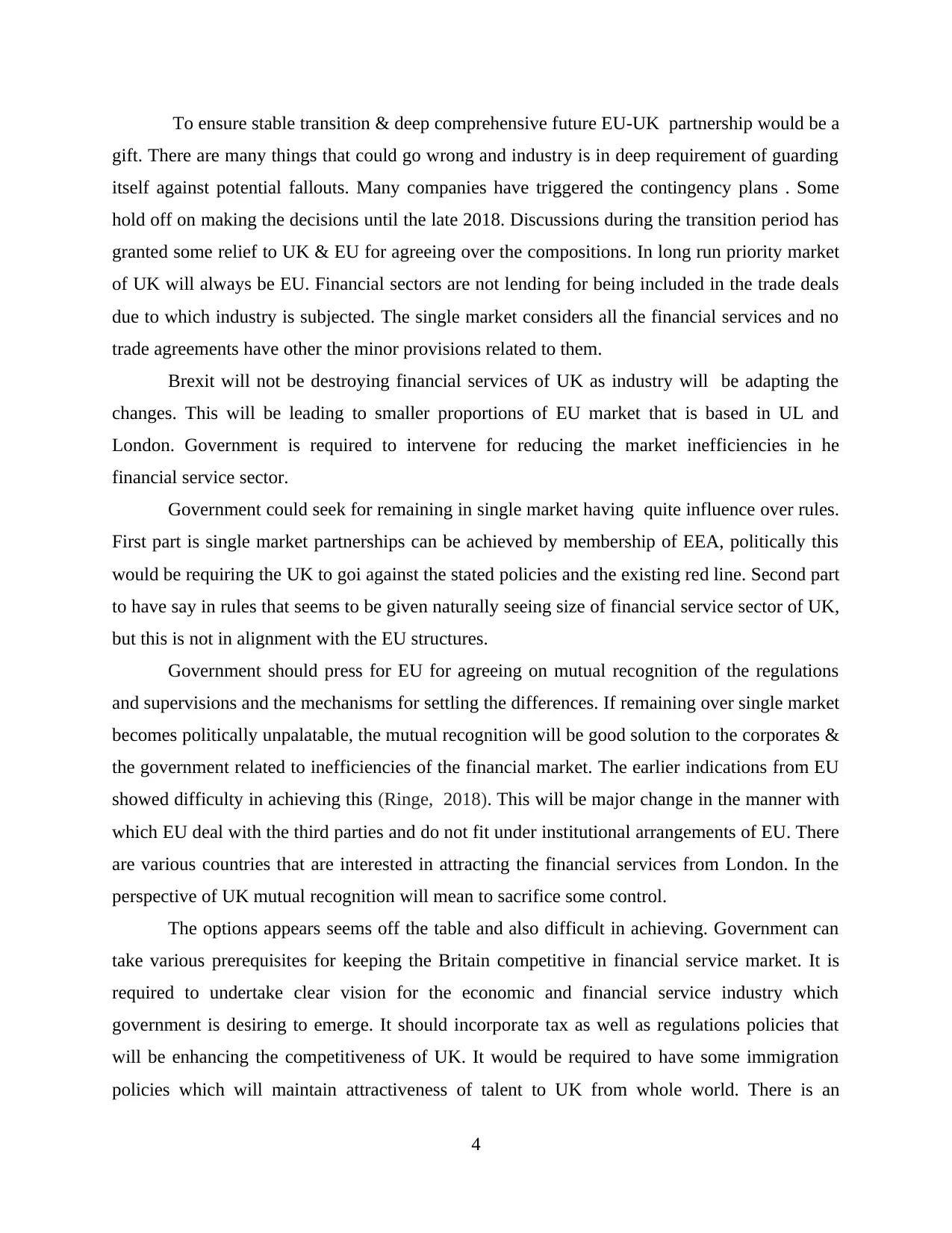
To ensure stable transition & deep comprehensive future EU-UK partnership would be a
gift. There are many things that could go wrong and industry is in deep requirement of guarding
itself against potential fallouts. Many companies have triggered the contingency plans . Some
hold off on making the decisions until the late 2018. Discussions during the transition period has
granted some relief to UK & EU for agreeing over the compositions. In long run priority market
of UK will always be EU. Financial sectors are not lending for being included in the trade deals
due to which industry is subjected. The single market considers all the financial services and no
trade agreements have other the minor provisions related to them.
Brexit will not be destroying financial services of UK as industry will be adapting the
changes. This will be leading to smaller proportions of EU market that is based in UL and
London. Government is required to intervene for reducing the market inefficiencies in he
financial service sector.
Government could seek for remaining in single market having quite influence over rules.
First part is single market partnerships can be achieved by membership of EEA, politically this
would be requiring the UK to goi against the stated policies and the existing red line. Second part
to have say in rules that seems to be given naturally seeing size of financial service sector of UK,
but this is not in alignment with the EU structures.
Government should press for EU for agreeing on mutual recognition of the regulations
and supervisions and the mechanisms for settling the differences. If remaining over single market
becomes politically unpalatable, the mutual recognition will be good solution to the corporates &
the government related to inefficiencies of the financial market. The earlier indications from EU
showed difficulty in achieving this (Ringe, 2018). This will be major change in the manner with
which EU deal with the third parties and do not fit under institutional arrangements of EU. There
are various countries that are interested in attracting the financial services from London. In the
perspective of UK mutual recognition will mean to sacrifice some control.
The options appears seems off the table and also difficult in achieving. Government can
take various prerequisites for keeping the Britain competitive in financial service market. It is
required to undertake clear vision for the economic and financial service industry which
government is desiring to emerge. It should incorporate tax as well as regulations policies that
will be enhancing the competitiveness of UK. It would be required to have some immigration
policies which will maintain attractiveness of talent to UK from whole world. There is an
4
gift. There are many things that could go wrong and industry is in deep requirement of guarding
itself against potential fallouts. Many companies have triggered the contingency plans . Some
hold off on making the decisions until the late 2018. Discussions during the transition period has
granted some relief to UK & EU for agreeing over the compositions. In long run priority market
of UK will always be EU. Financial sectors are not lending for being included in the trade deals
due to which industry is subjected. The single market considers all the financial services and no
trade agreements have other the minor provisions related to them.
Brexit will not be destroying financial services of UK as industry will be adapting the
changes. This will be leading to smaller proportions of EU market that is based in UL and
London. Government is required to intervene for reducing the market inefficiencies in he
financial service sector.
Government could seek for remaining in single market having quite influence over rules.
First part is single market partnerships can be achieved by membership of EEA, politically this
would be requiring the UK to goi against the stated policies and the existing red line. Second part
to have say in rules that seems to be given naturally seeing size of financial service sector of UK,
but this is not in alignment with the EU structures.
Government should press for EU for agreeing on mutual recognition of the regulations
and supervisions and the mechanisms for settling the differences. If remaining over single market
becomes politically unpalatable, the mutual recognition will be good solution to the corporates &
the government related to inefficiencies of the financial market. The earlier indications from EU
showed difficulty in achieving this (Ringe, 2018). This will be major change in the manner with
which EU deal with the third parties and do not fit under institutional arrangements of EU. There
are various countries that are interested in attracting the financial services from London. In the
perspective of UK mutual recognition will mean to sacrifice some control.
The options appears seems off the table and also difficult in achieving. Government can
take various prerequisites for keeping the Britain competitive in financial service market. It is
required to undertake clear vision for the economic and financial service industry which
government is desiring to emerge. It should incorporate tax as well as regulations policies that
will be enhancing the competitiveness of UK. It would be required to have some immigration
policies which will maintain attractiveness of talent to UK from whole world. There is an
4
Paraphrase This Document
Need a fresh take? Get an instant paraphrase of this document with our AI Paraphraser
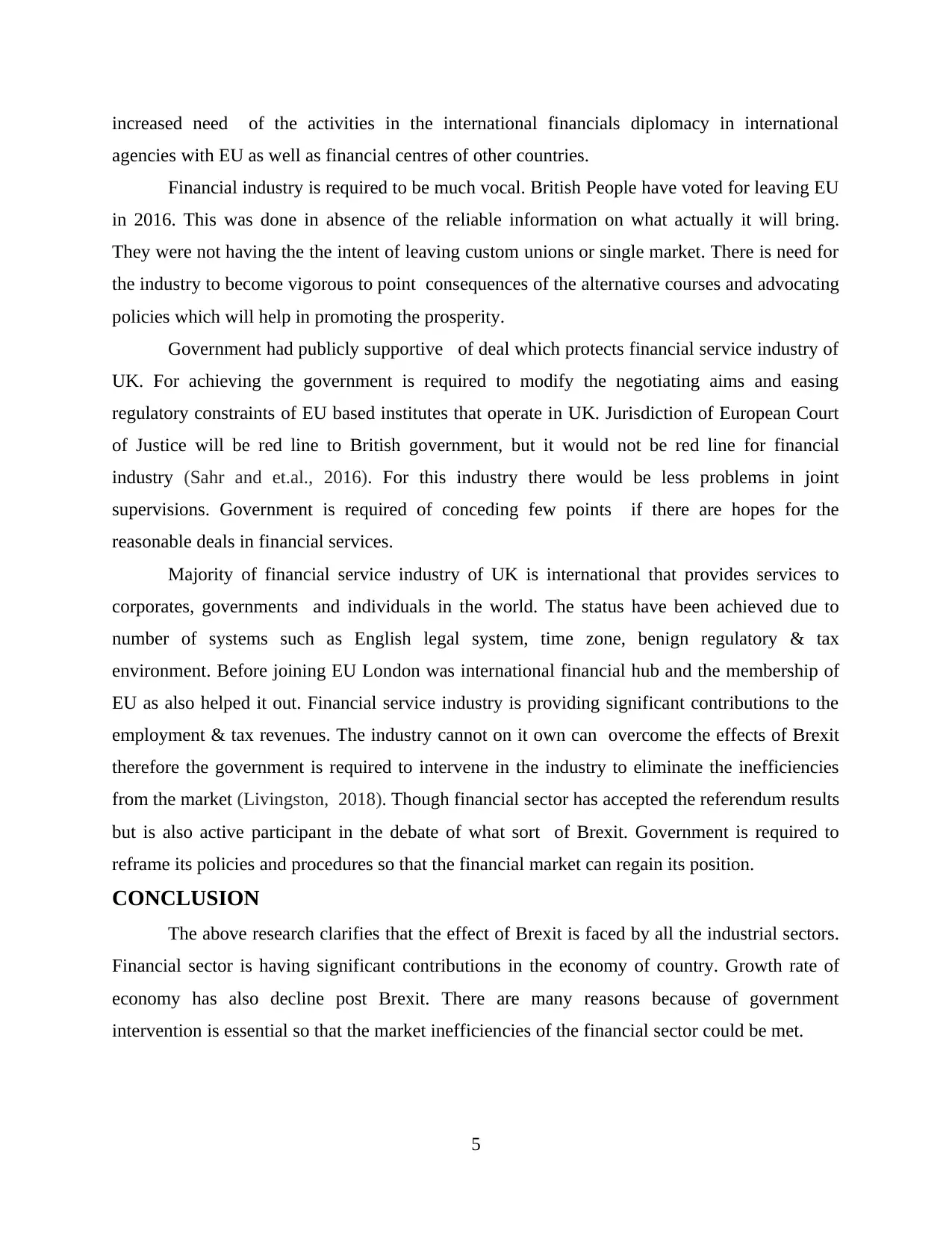
increased need of the activities in the international financials diplomacy in international
agencies with EU as well as financial centres of other countries.
Financial industry is required to be much vocal. British People have voted for leaving EU
in 2016. This was done in absence of the reliable information on what actually it will bring.
They were not having the the intent of leaving custom unions or single market. There is need for
the industry to become vigorous to point consequences of the alternative courses and advocating
policies which will help in promoting the prosperity.
Government had publicly supportive of deal which protects financial service industry of
UK. For achieving the government is required to modify the negotiating aims and easing
regulatory constraints of EU based institutes that operate in UK. Jurisdiction of European Court
of Justice will be red line to British government, but it would not be red line for financial
industry (Sahr and et.al., 2016). For this industry there would be less problems in joint
supervisions. Government is required of conceding few points if there are hopes for the
reasonable deals in financial services.
Majority of financial service industry of UK is international that provides services to
corporates, governments and individuals in the world. The status have been achieved due to
number of systems such as English legal system, time zone, benign regulatory & tax
environment. Before joining EU London was international financial hub and the membership of
EU as also helped it out. Financial service industry is providing significant contributions to the
employment & tax revenues. The industry cannot on it own can overcome the effects of Brexit
therefore the government is required to intervene in the industry to eliminate the inefficiencies
from the market (Livingston, 2018). Though financial sector has accepted the referendum results
but is also active participant in the debate of what sort of Brexit. Government is required to
reframe its policies and procedures so that the financial market can regain its position.
CONCLUSION
The above research clarifies that the effect of Brexit is faced by all the industrial sectors.
Financial sector is having significant contributions in the economy of country. Growth rate of
economy has also decline post Brexit. There are many reasons because of government
intervention is essential so that the market inefficiencies of the financial sector could be met.
5
agencies with EU as well as financial centres of other countries.
Financial industry is required to be much vocal. British People have voted for leaving EU
in 2016. This was done in absence of the reliable information on what actually it will bring.
They were not having the the intent of leaving custom unions or single market. There is need for
the industry to become vigorous to point consequences of the alternative courses and advocating
policies which will help in promoting the prosperity.
Government had publicly supportive of deal which protects financial service industry of
UK. For achieving the government is required to modify the negotiating aims and easing
regulatory constraints of EU based institutes that operate in UK. Jurisdiction of European Court
of Justice will be red line to British government, but it would not be red line for financial
industry (Sahr and et.al., 2016). For this industry there would be less problems in joint
supervisions. Government is required of conceding few points if there are hopes for the
reasonable deals in financial services.
Majority of financial service industry of UK is international that provides services to
corporates, governments and individuals in the world. The status have been achieved due to
number of systems such as English legal system, time zone, benign regulatory & tax
environment. Before joining EU London was international financial hub and the membership of
EU as also helped it out. Financial service industry is providing significant contributions to the
employment & tax revenues. The industry cannot on it own can overcome the effects of Brexit
therefore the government is required to intervene in the industry to eliminate the inefficiencies
from the market (Livingston, 2018). Though financial sector has accepted the referendum results
but is also active participant in the debate of what sort of Brexit. Government is required to
reframe its policies and procedures so that the financial market can regain its position.
CONCLUSION
The above research clarifies that the effect of Brexit is faced by all the industrial sectors.
Financial sector is having significant contributions in the economy of country. Growth rate of
economy has also decline post Brexit. There are many reasons because of government
intervention is essential so that the market inefficiencies of the financial sector could be met.
5
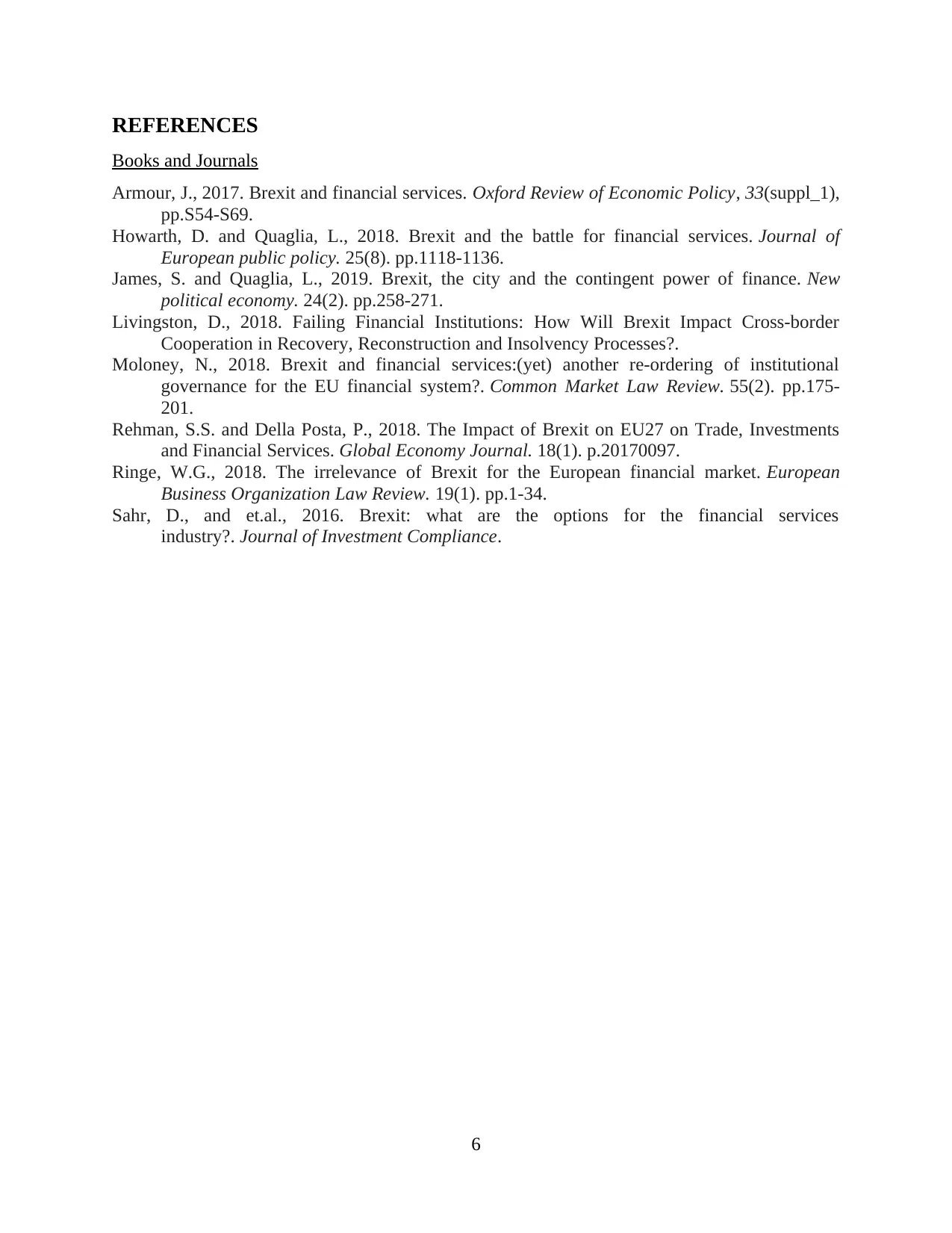
REFERENCES
Books and Journals
Armour, J., 2017. Brexit and financial services. Oxford Review of Economic Policy, 33(suppl_1),
pp.S54-S69.
Howarth, D. and Quaglia, L., 2018. Brexit and the battle for financial services. Journal of
European public policy. 25(8). pp.1118-1136.
James, S. and Quaglia, L., 2019. Brexit, the city and the contingent power of finance. New
political economy. 24(2). pp.258-271.
Livingston, D., 2018. Failing Financial Institutions: How Will Brexit Impact Cross-border
Cooperation in Recovery, Reconstruction and Insolvency Processes?.
Moloney, N., 2018. Brexit and financial services:(yet) another re-ordering of institutional
governance for the EU financial system?. Common Market Law Review. 55(2). pp.175-
201.
Rehman, S.S. and Della Posta, P., 2018. The Impact of Brexit on EU27 on Trade, Investments
and Financial Services. Global Economy Journal. 18(1). p.20170097.
Ringe, W.G., 2018. The irrelevance of Brexit for the European financial market. European
Business Organization Law Review. 19(1). pp.1-34.
Sahr, D., and et.al., 2016. Brexit: what are the options for the financial services
industry?. Journal of Investment Compliance.
6
Books and Journals
Armour, J., 2017. Brexit and financial services. Oxford Review of Economic Policy, 33(suppl_1),
pp.S54-S69.
Howarth, D. and Quaglia, L., 2018. Brexit and the battle for financial services. Journal of
European public policy. 25(8). pp.1118-1136.
James, S. and Quaglia, L., 2019. Brexit, the city and the contingent power of finance. New
political economy. 24(2). pp.258-271.
Livingston, D., 2018. Failing Financial Institutions: How Will Brexit Impact Cross-border
Cooperation in Recovery, Reconstruction and Insolvency Processes?.
Moloney, N., 2018. Brexit and financial services:(yet) another re-ordering of institutional
governance for the EU financial system?. Common Market Law Review. 55(2). pp.175-
201.
Rehman, S.S. and Della Posta, P., 2018. The Impact of Brexit on EU27 on Trade, Investments
and Financial Services. Global Economy Journal. 18(1). p.20170097.
Ringe, W.G., 2018. The irrelevance of Brexit for the European financial market. European
Business Organization Law Review. 19(1). pp.1-34.
Sahr, D., and et.al., 2016. Brexit: what are the options for the financial services
industry?. Journal of Investment Compliance.
6
⊘ This is a preview!⊘
Do you want full access?
Subscribe today to unlock all pages.

Trusted by 1+ million students worldwide
1 out of 9
Related Documents
Your All-in-One AI-Powered Toolkit for Academic Success.
+13062052269
info@desklib.com
Available 24*7 on WhatsApp / Email
![[object Object]](/_next/static/media/star-bottom.7253800d.svg)
Unlock your academic potential
Copyright © 2020–2026 A2Z Services. All Rights Reserved. Developed and managed by ZUCOL.





